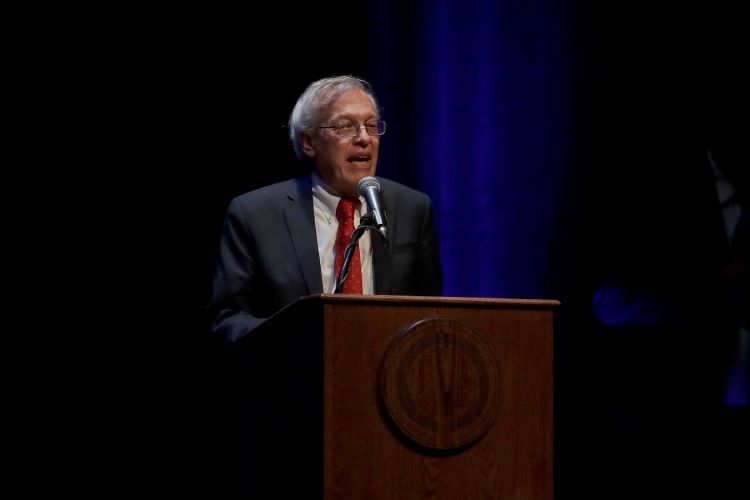Berkeley Law dean thinks school is on 'strong legal ground' after student groups ban Zionist speakers

Erwin Chemerinsky, the dean of the University of California at Berkeley School of Law, speaks during a lecture at the university in October 2019. Photo by Jeff Chiu/The Associated Press.
Erwin Chemerinsky, the dean of the University of California at Berkeley School of Law, said he will cooperate in an investigation spurred by a ban on Zionist speakers by several student groups.
The U.S. Department of Education’s Office for Civil Rights is asking for the law school’s response after two lawyers filed a complaint claiming that the ban amounts to antisemitic discrimination, according to Law.com. The investigation does not amount to a determination that the case has merit.
“This is simply that two lawyers filed a complaint with the Office of Civil Rights, and we have been asked to respond,” Chemerinsky told Law.com. “The university, of course, will fully cooperate with the investigation.”
Chemerinsky, an ABA Journal columnist, told the New York Times that he think that the school is on “strong legal ground” because student groups have a right to ban speakers based on viewpoints. In an online message to students, Chemerinsky said requiring student groups to invite speakers with “views they loathe” would violate the First Amendment as a form of compelled speech.
Chemerinsky is Jewish and a Zionist who supports the existence of Israel, although he condemns many of its policies. Indeed, he could not speak to student groups with the ban. But he told the New York Times that a student group has the right to choose speakers it will invite on the basis of viewpoints.
“Jewish law students don’t have to invite a Holocaust denier,” Chemerinsky told the New York Times. “Black students don’t have to invite white supremacists. If the women’s law association is putting out a program on abortion rights, they can invite only those who believe in abortion rights.”
But student groups can’t ban people from membership based on characteristics like race, religion, sex or sexual orientation, Chemerinsky said.
“As I have emphasized, the law school has an ‘all-comers’ policy where all student groups and all student events must be open to all students,” Chemerinsky wrote in his online message.
The Berkeley Law chapter of Law Students for Justice in Palestine announced in August that it had adopted the speaker ban by changing one of its bylaws. The group said it would not invite “speakers that have expressed and continued to hold views or host/sponsor/promote events in support of Zionism, the apartheid state of Israel and the occupation of Palestine.” Eight other groups were also adopting such bans, Law Students for Justice in Palestine said.
Chemerinsky then spoke with the university’s Hillel rabbi and with several Jewish students. He wrote a letter to all student group leaders that said he strongly supported the free speech rights of all students, but he thought that the bylaw was inconsistent with Berkeley Law’s values and its commitment that all viewpoints be expressed, according to Chemerinsky’s online message.
The debate heated up in September with the publication of an article in the Jewish Journal about the ban headlined: “Berkeley Develops Jewish-Free Zones.” Anti-Zionism is “flatly antisemitic,” according to the article written by Kenneth Marcus, the Education Department’s civil rights chief during the Trump administration.
Five more student groups have adopted the anti-Zionist bylaw, bringing the total to 14, according to the lawyers who filed the complaint with the Education Department. They are Florida lawyer and Jewish rights leader Gabriel Groisman and Israel-based lawyer Arsen Ostrovsky, a human rights lawyer and CEO of the International Legal Forum.
The lawyers explained why they filed the complaint in an article in Newsweek.
“The student groups at Berkeley Law are being willfully deceptive,” wrote Groisman and Ostrovsky in Newsweek. “Rather than simply exclude Jewish speakers, they exclude speakers who have expressed and continue to hold views in support of Zionism. … A rejection of those who identify as Zionists, which is a vast, overwhelming majority of Jews, is therefore no different to excluding anyone else on the basis of their faith, shared ancestry or national origin.”
Updated Jan. 6 at 12:30 p.m. to correct a reference to Anti-Zionism and a sentence in the 11th paragraph.



